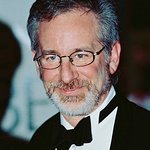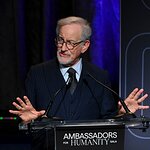Steven Spielberg delivered the keynote address on the International Day of Commemoration in memory of the victims of the Holocaust in New York today.
The Holocaust took the lives of 6 million Jews and countless other victims who suffered at the hands of the Nazis and their collaborators seven decades ago.
Understanding its causes, the impact it had on the victims and their families, and finding a means of preventing other such atrocities today is the main reason why the United Nations and countries around the world hold memorial ceremonies every year.
Following the release of his film Schindler’s List in 1993, Mr. Spielberg solidified his commitment to keeping alive the memory and lessons of the Holocaust by founding the University of Southern California Shoah Foundation — The Institute for Visual History and Education. Established to collect and preserve testimonies of survivors and other witnesses to the Holocaust, the Institute maintains one of the world’s largest video digital libraries — nearly 52,000 video testimonies in 32 languages from 56 countries. Please visit www.sfi.usc.edu for more information.
“Genocide is an evil. But, the greatest evil is when people who have been spared the horrors commit themselves to despair,” Spielberg said. “We know despair and remembering are a choice. But we need to confront and act on what we learned.”
The International Day marks the anniversary of the 1945 liberation of the Auschwitz-Birkenau German Nazi Concentration and Extermination Camp. Visiting the Auschwitz-Birkenau Memorial and State Museum this past November, United Nations Secretary-General Ban Ki-moon said: “We will continue to shine a light on these unspeakable crimes so that they may never be repeated.” Emphasizing the importance of formal instruction on this subject, the Secretary-General has also said that education and public awareness are the first defense against prejudice, ethnic hatred and intolerance. To work towards these goals, The Holocaust and the United Nations Outreach Programme have created a multifaceted educational initiative involving students around the world through the global network of United Nations Information Centres, which will also organize commemorative events this week.
Following a video message from Secretary-General Ban, other speakers at the United Nations memorial ceremony included H.E. Mr. John Ashe, President of the 68th session of the United Nations General Assembly; and H.E. Mr. Ron Prosor and H.E. Ms. Samantha Power, Permanent Representatives of Israel and the United States to the United Nations, respectively.
Rena Finder, a Holocaust survivor whose name appeared on the real-life Schindler’s List, also shared her testimony. “Encouraging young people to be more accepting of others and learn from the cruelty that was inflicted on Jews and other minorities during the Holocaust has been my life’s work,” said Mrs. Finder. Students who study the Holocaust at the Bronx High School for Science also took part: Sofie Somoroff, Afsara Ali, Kevin Xia and Bhaavya Sinha.
Cantor Shmuel Barzilai recited the memorial prayers with keyboard accompanist Jonathan Rimberg, following musical interludes performed by the 92nd Street Y Woodwind Quintet.
“Remembrance Week: Journeys through the Holocaust,” will be held from 23 to 29 January at United Nations Headquarters in New York. Two exhibitions will open, one to mark the seventieth anniversary of the deportation of the Jews in Hungary on 23 January and another on the March of the Living International on 28 January. In addition, the film Blinky & Me, directed and produced by Tomas Magierski, on the life of animator and Holocaust survivor Yoram Gross, will be screened on 28 January.
The full calendar of events is available at www.un.org/holocaustremembrance.
The Holocaust and the United Nations Outreach Programme, called for by General Assembly resolution 60/7, was established in 2006 to encourage education about, and remembrance of, the Holocaust.






